How many years do canaries live and what does it depend on?
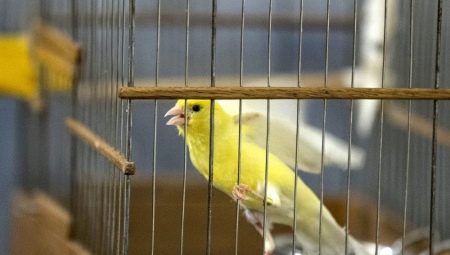
Canaries today are often found in Russian families as pets. These birds are loved for their benevolence, shrewd mind and restlessness. From the article you will find out how many years canaries live in the wild and at home, as well as what factors affect the lifespan of these birds.
How long do they live in nature?
In their homeland - the Canary Islands - these cute birds prefer to move in small flocks of up to 15 individuals, rarely staying in one place. In the wild, their diet consists of seeds from seasonal plants and small insects. Most of all, these birds love cabbage or lettuce leaves, therefore they often settle near human settlements.
Unlike other birds, canaries are real neat. They just love to swim in water and generally consume more water than other birds. To feel safe at night, these birds gather in flocks and spend the night in tall trees.
As soon as the nesting period begins, canaries go in search of a pair and move away from the whole flock. These birds place their nests, made from plant fluff, moss and dry grass, high above the ground in inaccessible tree crowns. The clutch usually consists of 3-5 eggs, which are incubated by the female for two weeks. An interesting fact - during this time the male leaves the nest only in search of food, and the rest of the time entertains the female with singing or protects her from other birds and animals.
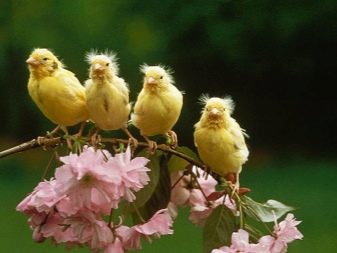
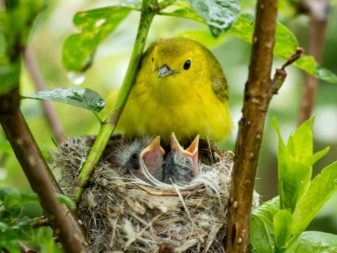
Approximately 2.5 weeks after the birth of the chicks, they begin to intensively learn to fly, drink water and get their own food. The male helps them tirelessly in this.A little later, he leaves the chicks and returns to the female, which is building a new nest in another place. In one nesting period, canaries can lay eggs from 1 to 3 times. After the end of this period, the couple returns to their flock again or is looking for a new one.
Under natural conditions, canaries live on average from 8 to 10 years.
Lifetime at home
Usually, canaries are preferred to be kept in small metal cages for poultry or in spacious aviaries. In such conditions, these pets, of course, are not threatened by dangerous animals, as in the wild, but there are also disadvantages in such content.
In captivity, canaries usually live for quite a long time - from 10 to 15 years, which depends on many nuances.
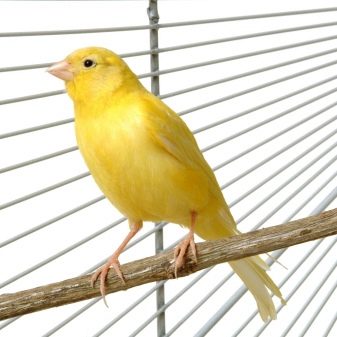
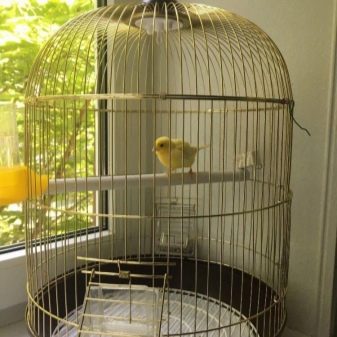
What factors does it depend on?
Canaries are very delicate pets in terms of maintenance and care, and therefore maximum attention and patience will be required from their owners. The lifespan of birds depends on factors such as nutrition, housing conditions, care, heredity, as well as the attitude of the owner himself to the pet, which should be paid attention to when keeping a canary.
- Heredity. Inexperienced owners often do not pay any attention to such an important factor as heredity and predisposition to diseases. Most often this happens due to the fact that the pet was not purchased in a specialized nursery, but from hands, where any documents, pedigree or veterinary passport were not provided. When buying canaries, even if you are purchasing a pet from a proven nursery, carefully examine the appearance of the bird. It should be active, without wet feathers near the anus or beak, the feathers should fit snugly to the body and not be tousled.
- Loneliness. Like all domesticated birds, canaries are incredibly social and active. They are unable to do without someone else's company for a long time and constantly try to attract attention to themselves: they call for games or are simply teased. From a lack of attention from their owners, canaries literally wither and withdraw into themselves. All this can lead to disastrous consequences - depression and apathy, from which the bird is difficult to remove. To avoid such problems, breeders advise placing cages with birds in the apartment so that the owners are always in the canary's field of vision - so it will not feel abandoned.
- Other pets. Experts advise keeping canaries either alone or together with an individual from the same flock of the same age. If you decide to make friends with a young and relatively old canary, then it is unlikely that anything will come of it. The same goes for different species. It is especially worth protecting this bird from other pets. Canaries will never have friendship with cats and dogs, only gloating and teasing.
- Indoor climate. The room in which your feathered pet lives should be clean, with an average level of humidity and without temperature fluctuations. It is important not to keep the canary in direct sunlight or leave it near windows - the bird can get sick from drafts. Best of all, these birds feel in a dry but ventilated room with a temperature of at least + 22 ... 24 degrees Celsius.
- Purity... Natural cleanliness was passed on to canaries from their ancestors living in dense forests. These birds do not like it when their cage or aviary is dirty or smells bad. From poor hygiene, these birds become silent, inactive and restless. There are frequent cases of aggression, when the bird rushed at the owner or ripped off the feathers.
- Diseases. As soon as you begin to notice strange behavior behind your domestic canary, or observe signs of some kind of illness, immediately take it to the veterinarian. In the case of an organism as delicate as the canary, self-medication can be fatal.
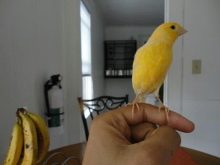
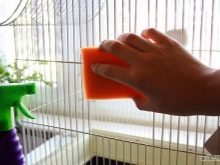
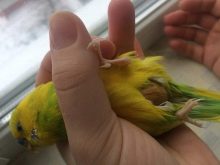
Feeding is the most important factor that affects both the health and the mood, the cheerfulness of the canary, and even how many years it will live. That is why this item will be considered separately from the others. When feeding a canary at home, follow the recommendations of the experts.
- Food for these birds should not only be rich in vitamins, but also balanced. The best option would be special food for canaries - no mixture for other birds will work here.
- The most difficult stage in feeding a canary is nesting and molting. At this time, the bird needs a special fortified diet.
- Canaries just love greens, so in the spring and summer seasons, include in your diet such plants as dandelion (leaves, of course), plantain, sorrel, lettuce.
- Of vegetables for canaries, carrots, apples and bell peppers will be useful. It is better if the vegetables are fresh. Remember to rinse fruits and vegetables thoroughly before serving them to your pet.
- As additives to the main food, you can add sunflower seeds, buckwheat grains (pounded) to canary feed. About 2 times a month, the diet can be enriched with boiled egg or cottage cheese with a low fat content.
- Some experts advise giving canaries disinfected river sand (as a top dressing).
- Calcium is an extremely important ingredient for canaries, and therefore it will be useful to add a little chalk or pounded eggshells to your food. The chalk can be conveniently hooked onto a hook and hung right in the cage.
- So that the birds can survive the winter without any problems and not get sick, sometimes charcoal should be added to the diet (you can buy it at the pharmacy). It serves as a universal medicine.
- And also do not forget to rinse the feeders from time to time, change their contents to a new one so that mold does not form there.
- Overfeeding the canary is not worth it, even if the pet shows with all its appearance that it wants more. For adult birds, no more than two tablespoons of feed per day, along with supplements, will be enough.
The best joy for your bird will be if you let it fly around the room a little. Such procedures, in the opinion of breeders, greatly improve the mood of canaries, make them more active and healthy.

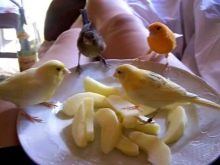
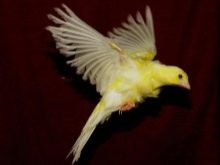
If you want to let your canary fly, there are certain rules to follow.
- Close all windows in the room tightly, close the doors. This is still a wild bird that wants to be free and can even fly off into the street. In addition, if the doors or windows are not closed, there is a possibility that they will slam shut from a draft and injure your pet.
- Remove all pets from the room. Even if it is a cat that just crawled under the sofa, or a dog that, it would seem, would never offend a fly.
- There should be no open containers of liquids in the room. As already mentioned, these birds love to swim and drink water, and therefore can simply be poisoned by inadvertently left chemicals or stagnant water.
- If you let your pet out in the kitchen, make sure that the burners are not on and there is no boiling water anywhere. And also the ventilation should be tightly closed at the time of the bird's walk.
- In general, try to keep your pet in sight during these walks.
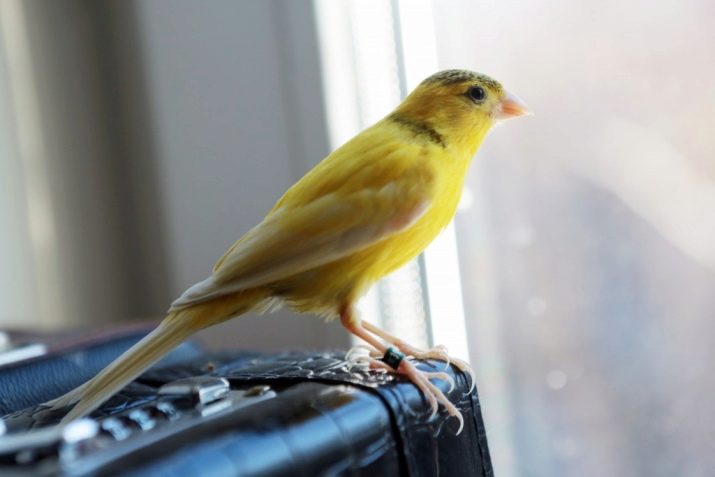
See below for canary care.








